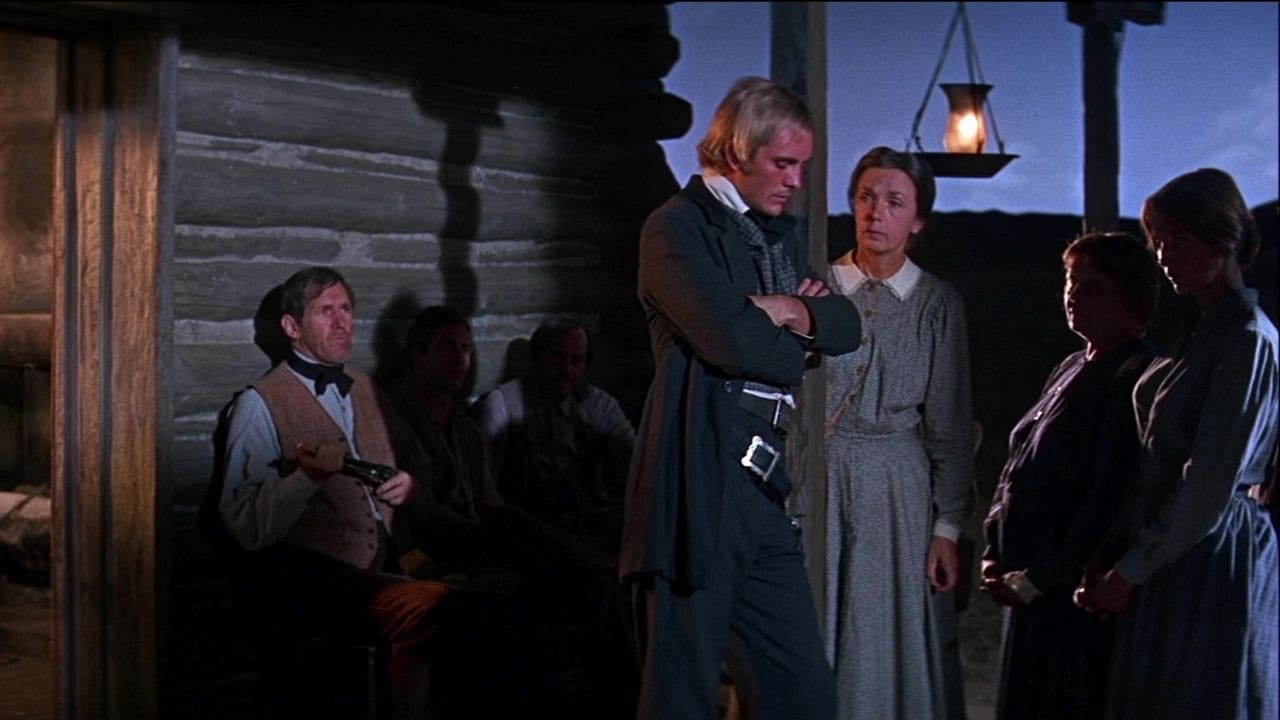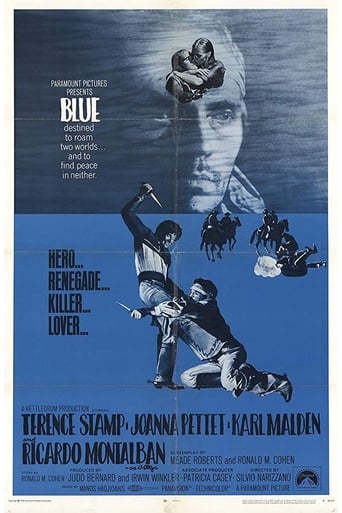



Well Deserved Praise
ridiculous rating
Highly Overrated But Still Good
Each character in this movie — down to the smallest one — is an individual rather than a type, prone to spontaneous changes of mood and sometimes amusing outbursts of pettiness or ill humor.
View More"Blue" seems to be a western that was made with the intention to mix elements of Hollywood westerns at the time with elements from Italian westerns made at the same time. With two sensibilities aimed at, it's probably no surprise that the end results are kind of uneven. Terence Stamp's character seems to have been concocted as some kind of silent spaghetti western individual, but he is so silent and aloof that it's hard to figure out what is going on in this cowboy's head. The problem is made worse by the pacing of the movie, which is really slow and didn't have to be stretched out to almost two hours in length. And there are some plot details that seem unfinished, like the romance that is brewed up between Blue and the daughter of the man who brings him in. Still, there are some good moments here and there, the photography of the movie is magnificent, and I have to admit that the movie has some sort of hypnotising spell that's hard to explain. As I indicated earlier, this movie is kind of mixed bag, so I think it's best reserved for western fans who are patient and are willing to put up with some flaws.
View MoreThis kicks off a four-movie tribute to the recently-deceased Silvio Narizzano who, in spite of his Italian name and Canadian origins, worked almost exclusively in English-language films; he made his name with the Oscar-nominated "Swinging Sixties" hit GEORGY GIRL (1966) which briefly took him to Hollywood where – like his contemporary Sidney J. Furie with THE APPALOOSA (1966) – he found himself turning a very ordinary cowboy tale into a Western with pretensions. In fact, I had missed out on this one a couple of times on Italian TV over the years, owing perhaps to its bad rep (Leonard Maltin rates this a measly *1/2) and, thus, made for a surprising choice to be issued on DVD (albeit emerging a no-frills affair) from Paramount...but, for this same reason, was extremely well-served by the transfer that utilized a gorgeous print whose colors leapt right off the screen on my 40" HD-TV!In any case, this is a Western that, while not quite following the "Spaghetti" model (apart from the reasonably graphic violence), was still deemed an arty aberration (not least because it had British leads!) – stylistically, the film seemed to evoke the self-indulgent ONE-EYED JACKS (1961; down to recruiting Karl Malden for a major role!) whereas, thematically, it owed a good deal to HOMBRE (1967) with its racial issues and martyr hero. Its lack of critical and commercial success, for one thing, sent off star Terence Stamp (as much a brooding presence here – he is silent for the first half-hour or so, with the title itself a reference to the color of his eyes and, in fact, he goes by the name Azul i.e. Spanish for 'blue' – as Marlon Brando and Paul Newman in the two-mentioned films respectively) into a 10-year period of European wanderings mainly devoted to highbrow/obscure fare! For the record, it was originally intended for Robert Redford who, bailing out at the proverbial 11th hour, subsequently found himself slapped with a lawsuit by the studio for breach-of-contract! The cast includes a couple of other popular names from this era: Joanna Pettet (who had been one of THE GROUP {1966}, here affecting a convincing drawl – though her acting and Stamp's is too modern for the genre, this only adds to the inherently offbeat nature of the film) and Stathis Giallelis (if only in a minor role – he is dispatched early on – having been the lead in Elia Kazan's America, America {1963}). Rounding out the protagonists are Malden, ever-reliable while not particularly taxed by his role of Pettet's dad (a doctor and thus a leading member of the settlers) and Ricardo Montalban, excellent as Stamp's own bandit-leader father (albeit only a surrogate) who had singled him out as his successor but now is inevitably drawn towards a face-off with him.Typically, when he is prone to be civilized, the hero has to withstand backlash from both the whites for his 'animalistic' behavior (especially from Pettet's boyfriend, though the two men eventually make up and the latter is virtually made Stamp's lieutenant!) and his adoptive 'family' for turning on them (he killed a 'brother' who had tried to rape the heroine). With this in mind, the finale is properly tinged with tragic poignancy as son shoots father dead and is himself gunned down by an uncle! When Montalban threatens to decimate the entire community over what he takes to be Stamp's treason, the latter feels obligated to teach the settlers how to defend themselves: though booby traps are effectively laid along the stretch of beach where the battle is waged, the bandits' come-uppance is dealt a bit too quickly and overwhelmingly (with few losses among their own numbers!); incidentally, Pettet takes a nasty fall (clearly unintended) during her rush to comfort the dying Stamp which the director opted to retain for the finished version! In the end, the chief assets here emerge to be pictorial and aural – courtesy of Stanley Cortez' sprawling cinematography and Manos Hadjidakis' flavorful score respectively – and these go a long way towards smoothing over the obvious narrative deficiencies (in the form of clichéd characterization and situations). A curious footnote: the contemporaneous FADE IN, a made-for-TV effort about the movie-making business that starred Burt Reynolds and which would eventually be credited to the fictitious Alan Smithee, reportedly features behind-the-scenes footage from the set of BLUE!
View MoreFor some reason I always looked back fondly on this film that I saw in the theater in the late '60s. However, when I watched it again almost 30 years later on VHS, I was really disappointed. Since I know now that lead actor Terrence Stamp grew up in England, I found his American/ Mexican character accent - at that time - not that believable. A few times he slipped back to his native British accent.This is one of those unusual films in which the good guy dies in the end. Many times, that makes for a more dramatic, memorable ending. Howevr, in this case, all it made for was a very unsatisfying finish. This is not something I'd eagerly wait another 30 years to see!
View MoreAlthough it has been castigated by the critics, this movie still has a lot going for it and is definitely worth seeing. Given a big budget for its time, it has outstanding photography, beautiful scenic vistas, a very good music score and great stunt work by the legendary Yakima Cannutt. It also has Terence Stamp, who is always worth watching, no matter what he does (if we skip Priscilla, Queen of the Desert). Yes, it is not hard to tell that he is an Englishman playing an American raised by Mexicans, but his lines are few and far between, and who cares anyway? If we can have Englishmen and Australians playing Roman gladiators without critical comment, let's give this one a break. I admit that, although the plot line intended to contrast a violent past with the power of love, a complete lack of tenderness in the love scenes was laughable. But overall, this movie beats most of John Wayne's westerns by a mile.
View More